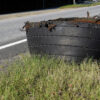|
Getting your Trinity Audio player ready...
|
The Association of County Commissions of Alabama kicked off its annual legislative conference in Auburn Tuesday as commissioners decide on their legislative priorities for the upcoming year.
The commissioners heard from a variety of speakers Wednesday on what to expect in the coming legislative session from a bill that could loosen some ethics laws that lawmakers say are overly vague, to a presentation on the new statehouse.
Sonny Kirkpatrick, executive director of the ACCA, said one priority for the association is passage of Amendment 1 that will appear on ballots in March.
The amendment would exempt local bills and local constitutional amendments from the state’s convoluted “budget isolation resolution” process that is required to take up any legislation before passage of the budgets.
Kirkpatrick explained the confusion over language in the 1984 legislation that requires approval from three-fifths of a quorum present, which he said has led to lawsuits over whether the BIR was done correctly.
”I’m illustrating the morass we have been dealing with when it comes to local legislation,” Kirkpatrick said.
The Legislature passed a bill in 2016 retroactively ensuring all local bills were valid, but did not fix the language moving forward.
Kirkpatrick said this amendment would resolve the issue once and for all.
State Rep. Joe Lovvorn, R-Auburn, chair of the House Rules Committee, gave a glimpse ahead at some of the Legislative priorities for 2024 including school choice, labor participation and particularly focusing on gaming.
“Every county has a different view of what is and isn’t legal in the state,” Lovvorn said. “There’s lots of quasi-legal activity in the state being operated by not the best public stewards.”
Lovvorn said gaming is beginning to get out of control, as some localities in Alabama have differing legal statuses than others, and the profit motive of illegal gaming is causing more and more problems throughout the state.
Othni Lathram, director of the Legislative Services Agency, said the new statehouse will better accommodate the public while making the facility safer for lawmakers and the public.
The current statehouse has faced issues from mold and asbestos to electrical fires, and was never designed to function as a civic building.
The new building is planned to bring the statehouse and capitol building into a more cohesive unit, with greenspace and a parking garage to replace the current statehouse lot.
Plans for the building include having both chambers together on the same floor, and more committee rooms that can hold a large number of citizens interested in participating in the process.





















































